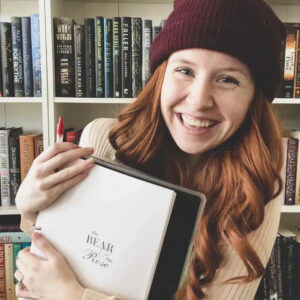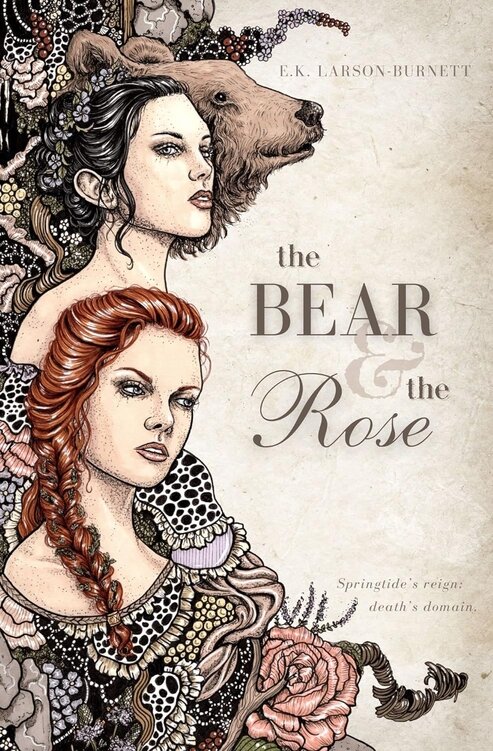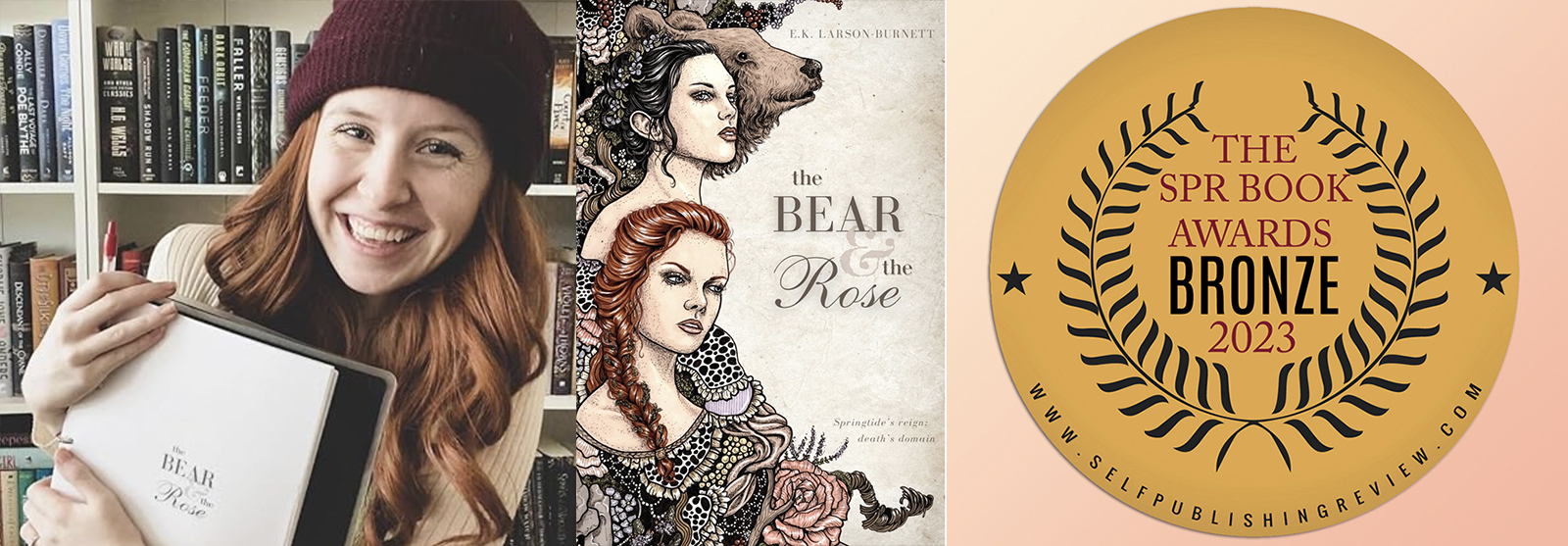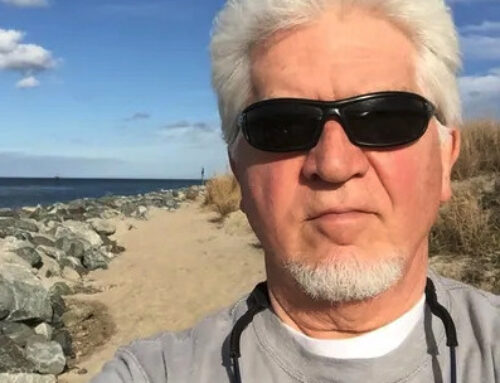 E.K. Larson-Burnett is a born-and-raised Southerner currently living in Katy, Texas, with her husband and their small domestic zoo. She is an avid ink drinker who lives and breathes books – during the day, she works remotely with authors around the world, honing and perfecting books published through Atmosphere Press. By night, she crafts her own stories…or at least tries to. The Bear & the Rose is her debut novel.
E.K. Larson-Burnett is a born-and-raised Southerner currently living in Katy, Texas, with her husband and their small domestic zoo. She is an avid ink drinker who lives and breathes books – during the day, she works remotely with authors around the world, honing and perfecting books published through Atmosphere Press. By night, she crafts her own stories…or at least tries to. The Bear & the Rose is her debut novel.
Why did you choose to self-publish?
I am a bona fide control freak, especially when it comes to things for which I have an extensive vision – I have a hard time trusting someone else will take care of my writing (a very intimate, vulnerable part of my life) in the same way I am able to. It was honestly a choice made out of pure perfectionist paranoia.
I think one day I would consider querying and dipping my toe in the traditional publishing world, but I don’t feel like I’m ready for that quite yet!
What do you think are the main pitfalls for indie writers?
Imposter syndrome, feeling boxed in by what’s “mainstream,” and obsessing over numbers. I truly believe a big part of being an indie author is trusting your book will find its readers no matter your efforts—in this age of algorithms and automation (oh, and BookTok!), it’s easy to feel like you are not doing enough, and the numbers can be disheartening. Like, really disheartening.
But I find that the deeper I wallow, the greater the disappointment and the worse things start to get. Authorship is a mindset, and belief in your work goes a long way. Your story will find its home.
 What tips can you give other authors looking to self-publish?
What tips can you give other authors looking to self-publish?
Invest in the important stuff – an editor, a professional book cover – and do plenty of research for every step of the process. Trust your gut and stand up for what you want when it comes to contracting work on your book, but also maintain an open mind and be receptive to feedback/critique. Proofread thoroughly. Keep your keywords up to date.
It’s a big commitment, but well worth it.
How do you deal with writer’s block?
Haha, deal with writer’s block? Do you mean suffer in its grip until serendipity deigns to bestow inspiration upon me?
In all seriousness, I haven’t found a tried-and-true method of overcoming writer’s block. Mostly it’s a result of burnout, which signals that maybe I just need a break and the space to think without feeling the pressure of putting words to paper. Typically if I try to force my way through it, my writing suffers, so I just let the ideas marinate until I feel ready to tackle the keyboard with true gusto.
Tell us about the genre you wrote in, and why you chose to write this sort of book.
I’ve always been a big ol’ fantasy geek, so writing within the genre only felt natural. The mythological and folkloric aspects are what inspired the story to begin with, though they did wriggle further toward the forefront the more I wrote!
My maternal grandmother was from Ireland, so I’ve always held a fascination for all things Celtic, but especially the mythology, and while I didn’t adhere strictly to what’s known of the Celtic pantheon and manipulated certain elements for the story’s needs, I still like how I was able to portray lesser-known elements of the lore.
Who are your biggest writing inspirations and why?
Any author whose writing touches my soul inspires me. I’m a very avid lover of polished, poetic prose with descriptions that elicit a feeling of magic; of words that strike within me a raw, human ache that says, “Yes, I feel this in my core.”
Some of my favorite writers include Kiran Millwood Hargrave, Mary E. Pearson, Elif Shafak, Erin Swan, and Sylvia Moreno-Garcia.

Why did you write about this particular subject?
Beyond the genre and my fascination with mythology, I wanted to write characters that felt raw and real – I wanted them to be flawed and uncertain and messy while still exuding strength and perseverance and beauty. Good and bad. Right and wrong. All of it entirely human.
What did you learn on your journey as an author?
I think I learned more about myself as a person than I did about the actual mechanics and processes of “making” a book. I was already fairly familiar with what went into book production since I work for a hybrid publisher, but I certainly didn’t anticipate all the feelings I felt.
When I was younger, all I really imagined upon becoming a published author was seeing the book in print and experiencing profound joy – I never considered the more conflicting emotions; the doubt, the grief, the exhaustion. I never peeked past the sparkly dream curtain to examine the potential emotional toll, so when the day arrived, my book was published, and I officially became an author, I learned a lot about myself.
I also learned I would do it all over again – the exciting and the painful – in a heartbeat.
What’s next for you as an author?
I have lots of works in progress, but I’m not constricting myself to any deadlines or pressuring myself to push out another book! I want any work I put forth into the world to be something I’m proud of, so I’m taking my time, waffling between several projects:
My “quirky gothic ghostie” Victorian-inspired fantasy.
My “morally grey shieldmaidens against the world” story to add to my mythological fiction portfolio.
And my “cozy dark fantasy” novella that I intend to put out as a free reader magnet.
I’m just enjoying stress-free writing when I have the time (while trying very hard to ignore the whiplash-fast pace of the indie publishing world passing me by).
Author Links
Get an Editorial Review | Get Amazon Sales & Reviews | Get Edited | Get Beta Readers | Enter the SPR Book Awards | Other Marketing Services






















Leave A Comment